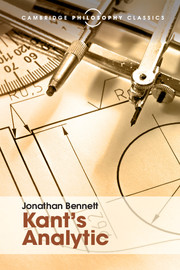Analytical table of contents
Published online by Cambridge University Press: 05 July 2016
Summary
Aesthetic
§1. The Aesthetic is supposed to concern the senses, as the Logic does the intellect; but it is better seen as a treatment of some problems about space and time.
§2. In his account of the analytic/synthetic distinction, Kant overlooks sentence-ambiguity; explains the distinction in psychologistic terms; and sometimes seems to count as analytic only the elementarily analytic or true by definition. §3. An a priori judgment is ‘necessary’ in a very strong sense. Kant's view that Euclid's theorems are a priori but not analytic appears false unless ‘analytic’ means ‘true by definition’. §4. However, Kant seems to think that Euclid's theorems are necessary not because they are (unelementarily) analytic but for some reason which does not rest on conceptual considerations. I shall construe him thus through §§5–8, but shall later re-interpret his conclusions in terms of what is analytic though not elementarily so.
§5. The outer-sense theory: the outer world as I experience it is Euclidean not because of uniformities in outer things but because of the uniform operation of my outer sense. §6. If this theory is a posteriori, so is Euclid's geometry; if it is elementarily analytic, it begs the question; and to call it synthetic and a priori is obscure. I shall argue that something like it is analytic, but not elementarily so (§§11–13). §7. Because he thinks it is synthetic and a priori, and because he offers it as a philosophical theory of great generality, Kant cannot take the outer-sense theory to be concerned with sense-organs or with anything phenomenal. §8. Kant's transcendental idealism (phenomenalism) says that what we can meaningfully say about phenomena, i.e. things which can be known through the senses, is restricted to what experience could teach us about them. He also thinks we have no concepts except phenomenal ones: so we cannot even speculatively apply concepts to the non-phenomenal, i.e. the noumenal. Yet he says there must be noumena, or at least that we must be able to ‘think’ noumena. The outer-sense theory seems to demand a noumenal subject-matter; but this would not be so if the theory did not have to be construed as synthetic and so did not have to reify outer sense.
§9. A spatial world must obey a geometry, and Kant may have thought that Euclid's is, although synthetic, the only consistent geometry.
- Type
- Chapter
- Information
- Kant's Analytic , pp. xiii - xxPublisher: Cambridge University PressPrint publication year: 2016

